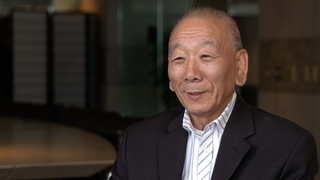Interviews
The political effects on Nikkei during the war (Spanish)
(Spanish) With regard to Chile, during the war, or immediately afterwards, it wasn’t very…how can I say this…pleasant for Nikkei. Even though the Chilean people never took any action against us, still there were of course political differences, due to the fact that Chile declared war against Japan, for example. But at that time, in the post-war period, at least insofar as I experienced it, I believe it was a time of Japan’s growth onto the world’s stage, don’t you think? From an economic standpoint, its culture generally became better known. And because of that, it was probably a more favorable time for us as Nikkei. In other words, it was good to be Nikkei. Like they say in Japan, right, “haku ga tsuku.” Meaning there were certain advantages, or maybe a certain respect, towards Nikkei, towards Japanese.
Date: October 7, 2005
Location: California, US
Interviewer: Ann Kaneko
Contributed by: Watase Media Arts Center, Japanese American National Museum
Explore More Videos

The riot in Manzanar
(b. 1921) Nisei veteran who served in the occupation of Japan

The Dopey bank that survived the war
(b. 1934) Award-winning Disney animation artist who was incarcerated at Topaz during WWII

Accepted by Japanese society as I learned more Japanese (Japanese)
(b. 1979) Sansei Nikkei Brazilian who lives in Oizumi-machi in Gunma prefecture. He runs his own design studio.

Evacuated to the Jungle
(b. 1938) Philipines-born hikiagesha who later migrated to the United States.

Captured by Guerillas after bombing of Pearl Harbor
(b. 1938) Philipines-born hikiagesha who later migrated to the United States.

Unique Identity from Having Multiple Backgrounds
(b. 1938) Philipines-born hikiagesha who later migrated to the United States.

Difficulty of spreading authentic sushi (Japanese)
(b. 1949) Sushi chef. Owner of Sushi Gen restaurant in Los Angeles’ Little Tokyo.

Teaching how to eat sushi (Japanese)
(b. 1949) Sushi chef. Owner of Sushi Gen restaurant in Los Angeles’ Little Tokyo.

Grandfather picked up by US Army
(b. 1952) Former banking executive, born in Hawaii

Growing up Japanese in Hawaii
(b. 1952) Former banking executive, born in Hawaii

Father's business partner operated their farming business during WWII
(b. 1935) Sansei businessman.

Father was convinced the constitution would protect him
(b. 1935) Sansei businessman.



